15th Annual International Society of Addiction Medicine Meeting
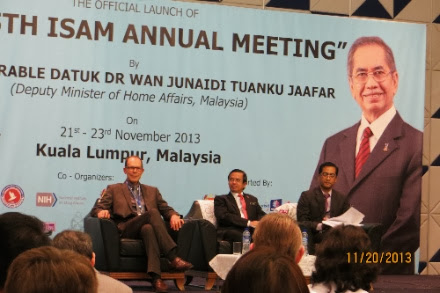
50 countries represented
Organized by ISAM, University of Malaya, Ministry of Home Affairs, Malaysia; Vice Chancellors Office, University of Malaya; Ministry of Health Malaysia; University of Malaya, Center of Addiction Sciences,; National Anti drug Agency; Department of Prison;Cyberjaya University College of Medical Sciences;Malaysian Culture and Exhibition Bureau; Ministry of Tourism and Culture; Malaysian AIDS Council; Reckitt Benckiser Pharmaceutical;Lundbeck International, Eli-Lilly, MANSA, CCM Pharmaceutical Division, Sunward Pharmaceutical
Opening prayer and praise
Presentation by Dr. Muhammad Muhsin Ahmad Zahari - Chairman of Local Organizing Committee for ISAM's 15th annual meeting 2013 (This is the first time that ISAM annual meeting will be held in the Asia Pacific region
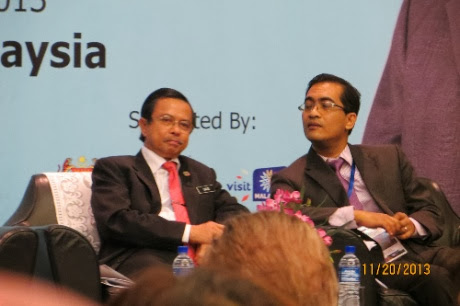
- he is pleased that the media has provided coverage and he is hopeful that this will reduce stigma for those suffering from addiction. He welcomed delegates and expressed his knowledge of the high quality of science and medicine that would be presented. He encouraged delegates to also enjoy Kuala Lumpur and hoped they'd experience the arts.
Then followed the welcome address by Professor Dr Hannu Alho, President of ISAM

He welcomed the delegates. He expressed appreciation for the pre conference training sessions yesterday. He spoke highly of the science at the conference but encouraged networking and the chance for delegates to meet others working in this field in their own countries
The Honorable Deputy Minister of Home Affairs, Malaysia, The Honorable Datuk, Dr Hj Wan Junaidi Tuanku Jaafar
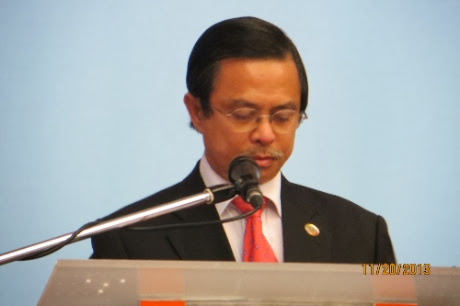
He opened by thanking the organizers and welcoming the delegates. He spoke to the range of addiction from illicit drugs, to alcohol, and behavioural addictions like gambling. He spoke of the governments introducing key programs to address the problems systematically. He gave a brief history of the work done in Malaysia. He described hospital resources, the recognition of addiction disease, and the need to identify the addicted person and do assessment to provide treatment. He described events from 1975 , the move from compulsory treatment to more voluntary treatments. He addressed the improvements in recidivism. He expressed the concern the government has for treatment of addiction and addressing addiction because it affects so negatively those young people. He described learning that 'cold turkey' simply didn't cure all the problems of addictions. He said that there was a growth in awareness that drug addiction resulted in a risk of relapse and a need to address multiple factors in their lives and recognize the effect addiction has on families. He noted the recognition of drug addiction ,spending more money and time with the addiction, having more withdrawal, and using more for longer. He felt there was a need to aim for at a drug free nation. He said that with the advent of HIV there was a recognition that to protect from HIV and spread with IV needles there was a need to adopt a harm reduction approach. HIV in IV drug users has dropped 29% from 72.4% in the Methadone Programs showing their success and the success of education. There is improvement in employment in those in medication assisted treatment, those in methadone programs is as high as 76% after 2 years in the program. Retention rates in the programs can be as high as 62%. 2/3s remain in the program. All this is proof of medication assisted approach. 2003 - Cochrane research showed people in medication assisted research are retained in programs. This allows comprehensive strategies to be used. He stated it was important to have doctors trained in addiction medicine. He described the work of the National Anti Drug Agency of Malaysia in treatment and rehabilitation. He described the contributions of public and private sections. He expressed the importance of psychosocial interventions. They include case management, programs, programs of education to reduce risks. The government encourages close cooperation between government and non government organizations. They recognize the realities. He described the need for one stop clinical settings that would provide assessments and treatment as well as services for psychosocial for addicted persons. There is a need for accessibility. Other venues need to be considered to, outreach to target groups, helping at diverse places. He expressed the governments concern for the need for addiction experts and addiction agencies to have support.
Government has been concerned with training programs , and community based research, especially supporting private and public services, identifying and preventing new addictions. The quality and outcome should be to reintegrate the drug dependent into society. Restoring social skills is supported. Treatment and rehabilitation of persons with drug addiction should be done in the community, not keeping them in isolated institutions. He described the various local programs in communities and the prison setting programs.
In closing he welcomed all delegates to Malaysia and hoped they would enjoy their stay and appreciate all that Malaysia has to offer. With that he said he took great pleasure in officially opening the 2013 ISAM conference.
At that a large gong was struck three times!
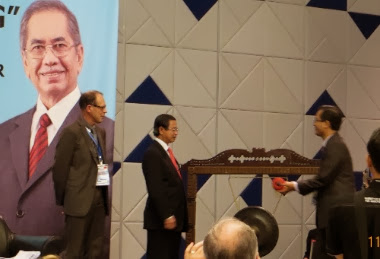
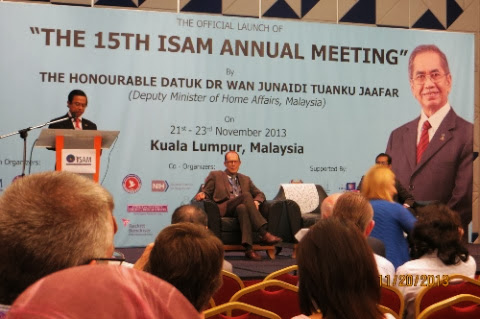





No comments:
Post a Comment